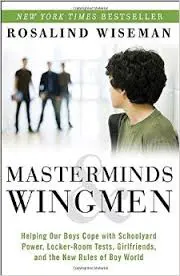Author Rosalind Wiseman first helped us understand the lives of today’s girls with her bestseller, Queen Bees and Wannabes. Now, she’s doing the same for boys with Masterminds and Wingmen: Helping Our Boys Cope with Schoolyard Power, Locker-Room Tests, Girlfriends, and the New Rules of Boy World. Your Teen caught up with Wiseman to learn more.
Rosalind Wiseman: Advice For Parents Of Boys
Q: Tell us about the research for Masterminds and Wingmen.
Wiseman: Over 200 boys really edited the book. It started with focus groups, but as I was writing, the boys vetted and edited every page. They told me what should be in there. For example, when I’d advise parents, I would first say to the boys, “Tell me exactly when you would stop listening to your parents,” and they did.
 Q: Culturally, our expectations for girls have changed a lot. What about expectations for boys?
Q: Culturally, our expectations for girls have changed a lot. What about expectations for boys?
Wiseman: There’s been so much wonderful work with girls, from giving them a language to talk about their emotions to recognizing how our culture can give girls toxic messages about their identity and worth. We have not done the same for boys. They are growing up in a vacuum void of good conversations with adults. Even adults who care about boys a great deal are not having the conversations they need.
Q: Give us an example.
Wiseman: Parents tend to be much more focused on what it’s like to be a girl in our culture. Take Halloween; parents worry about the appropriateness of girls’ costumes. We get upset, and rightfully so, when girls’ costumes come with push-up bras, but we should feel equally wary about boys’ costumes with six packs sewn in them.
Q: What’s the impact?
Wiseman: The culture is giving messages to boys about what they should be like. We’re not seeing boys in all their complexity or talking to them about it.
Q: What about peer relationships for boys?
Wiseman: Friendships are important to boys. This social connection is intrinsic to their identity, and it doesn’t matter where your son stands in the social hierarchy. It could be one friend or five. Parents can get focused on, “He doesn’t have enough friends.” But, I sometimes think having one true friend is better than having five because of the power dynamics in a group of five boys.
Q: How do we help them negotiate that?
Wiseman: If your son learns to needlessly capitulate or unnecessarily impose his decisions on others, he may carry that pattern of behavior to high school. As the power plays get more intense, he’s more likely to say nothing if things are going off the rails. There is nothing more difficult than navigating power, and we need to teach boys to be strong, confident and to speak truth to power. I didn’t say “kind,” by the way, because boys don’t like the words, “kind” and “nice.” Parents need to help their boys understand that the world is filled with people abusing power and that they will encounter it. Part of being a man of character is speaking truth to power. When you say it like that, the boys literally change their body position. They pay attention.
Q: Give us a script for helping boys speak truth to power.
Wiseman: You could say, “At some point, you will see things that are messed up, and it’s going to be really hard to know what to do. This can happen throughout your life. It could be what a guy is doing to another guy, what a guy’s doing to a girl and even what a girl is doing to a guy. It could be at a party, at school, in the locker room or at a house. When you first realize that something is wrong, it’s really easy to convince yourself it’s not serious. But, I want you to trust your gut or think about what I’d think if I could see what’s happening. If you can’t speak out in that moment, I’m asking you to leave the room and call me or another adult you trust. When this happens, and it will, I want you to know what to do so you are in control of yourself.”
Q: Parents of boys often say communication can be difficult. What helps?
Wiseman: The boys who helped me write this book were adamant about telling me, “You have to tell my mother and father to stop barraging me with questions when I get in the car.” The boys feel trapped. They don’t want to play 20 questions: Who was nice to you today? Who did you play with today? What did you have for lunch? What did the teacher say? Boys have to decompress from school, so asking them a million questions when you see them for the first time is not a relaxing way to start a conversation.
Q: Ouch. That seems so obvious when you hear it from the boys’ point of view. What’s a better approach?
Wiseman: Yes, seeing these things from their perspective helps to make sense of it all. But, that doesn’t change our right to express interest in their lives and their need to respond. Take advantage of small moments. Be content with quiet when you first see them or just ask a simple “Hey, what’s up?” Check in with them at night, when the lights are out, and you’re sitting at the foot of their bed: “Hey, is there anything you want to tell me? I just want to check in.” Those moments are the ways boys will talk to you if there is a problem.

 Q: Culturally, our expectations for girls have changed a lot. What about expectations for boys?
Q: Culturally, our expectations for girls have changed a lot. What about expectations for boys?


